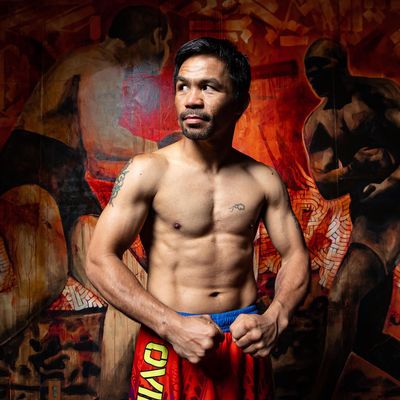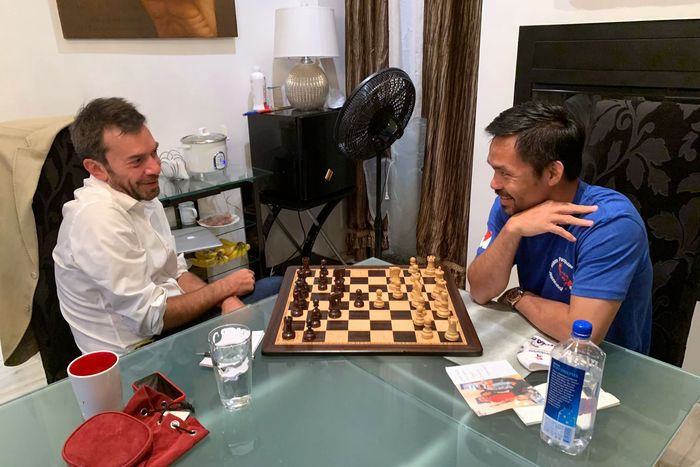
Manny Pacquiao sits at the head of the dining-room table, like he always does after meals in his Hollywood home. He kisses the hands of guests who filter in to seek his blessing, appropriately humming the theme to The Godfather as he studies the chessboard in front of him.
“That is what I am talking about,” he says, gazing deeper into the pieces and the position. “That is what I want.”
Pacquiao plays a traditional Sicilian defense, soon baiting me with traps and pins and forks, waiting patiently for the right moment to pounce. The kind of strategic thinking on display, fused with an unwavering confidence, is one reason Pacquiao, 42, has reigned over boxing for decades — and why it would be foolish to count him out as he mounts a run for the Filipino presidency.
His life story to this point is practically folklore. As a teenager, Pacquiao ran away from a home so poor that his father ate the family dog for food. He lived out of a cardboard box on the streets of Manila, where he sold doughnuts as a teenager. He found a gladiator-style boxing gym, and after his dizzying speed and power won him a series of bouts, he teamed up with legendary trainer Freddie Roach in Los Angeles. He went on to win world championships in eight title divisions, a feat no other boxer has achieved, and has earned a reported $500 million in winnings over 71 fights. (Career record: 62-7-2.) He is a cultural hero in the Philippines, also known for his humanitarian efforts: He has given away much of his fortune to strangers in need, building hospitals and pursuing other charitable ventures. And he parlayed his fame into a serious political career, getting elected as a congressman in 2010 and a senator in 2016.
Saturday night, he enters the ring in Las Vegas for perhaps the last time. He’ll face Yordenis Ugas, a Cuban welterweight and last-minute replacement for the undefeated Errol Spence, among the world’s most elite boxers, who pulled out of the fight because of an eye injury. The Pacquiao–Spence clash had arguably been the most anticipated fight of the year, and while the revised lineup doesn’t have the same marquee appeal, it will still serve as the unofficial kickoff moment for Pacquiao’s big campaign. He plans to officially announce his candidacy in October; the election is next May.
Pacquiao has been carefully planning for this moment. Along with his electoral wins, he rose to become the president of PDP-Laban, the center-left party chaired by President Rodrigo Duterte, the controversial Filipino hardliner best known outside the country for his program of hunting down and killing drug dealers. Pacquiao had gone along with his party boss until Duterte started floating plans to defy term limits and hold onto power by running as a vice-presidential candidate, with his daughter on top of the ticket. Pacquiao’s criticism led to his ouster from the leadership post. Duterte has called him “a shit” and “punch drunk,” and said, “When you are a champion in boxing, it doesn’t mean that you are a champion in politics.”
According to a poll last month, Duterte’s daughter is the heavy favorite to prevail in next year’s election, followed by Manila’s mayor. Pacquiao is trailing in fifth. On the ropes against the most powerful family in the country is not a favorable position, especially considering that political violence is common in the Philippines, with dissidents and their allies often prosecuted and jailed — or worse. But Pacquiao seems to relish his new role as political underdog. And like many a dark-horse candidate before him, he frames himself as an incorruptible outsider.
“My advantage in politics is this,” he says, and raises his finger to accentuate the point. “When [others] cross the line into the politics world, it’s a new world … You have power, popularity, fame. You become like a king, like a boss … and then you get eaten by the system of politics …” He repeats that line, falling into a preacher’s sing-song way of speaking. “But my situation is different,” he goes on. “Before I crossed the line into the politics world, I had experienced already fame, power, money. I already hold billions of [Filipino] pesos, maybe trillions …”
His platform is big on buzz words like “anti-corruption” and “economic development,” but thin on plans and specifics. He is deeply socially conservative, a fact a lot of people learned in 2016, after he denounced same-sex marriage and claimed LGBTQ couples were “worse than animals.” Nike dropped him and Pacquiao apologized, citing religious beliefs and Bible passages to support his views, an effort at damage control that fell short for many. His religiosity, though, may help him at the polls with the abundance of ultraconservative Filipino voters.
With the presidential palace beckoning, Pacquiao still has a fight to prepare for. And it may be one of the biggest of his career, given the stakes outside the ring. He’ll either fly back to the Philippines as a champ who once again defied the odds or as a loser, hardly great optics or material for political commercials. For most of the training camp, between his age and all the distractions, preparations have not gone particularly well. “Ups and downs, ups and downs,” trainer Roach says. “Sometimes he just isn’t there.”
Earlier that morning, just after dawn, Pacquiao led about two dozen supporters on a savage run through the winding canyons of Griffith Park to the observatory there. Flag- and boombox-toting runners in the pack sprinted up the mountain behind and alongside Pacquiao, following his bulging calves (the secret to his explosive ring movement) up another turn in the canyon. He makes this run three times a week, picking up supporters à la Rocky Balboa, and arriving for a public workout in the parking lot.
“You can’t beat Father Time, but you can negotiate with him,” Sean Gibbons, the president of his promotional company, says as the abdominal phase of the work begins. Pacquiao is directed to complete 1,150 sit-ups in various positions, a trainer says, followed by another 1,150 hours later in the gym.
The rounds in the gym — the shadowboxing, the heavy bag, speed bag, pad work — are so routine that he cruises through them on autopilot, occasionally pausing to sing to the music karaoke style and lead the crowd to another rendition of “Sweet Caroline.” Waiting for him afterward is Justin Fortune, his strength and conditioning coach, who beats his body up with a wooden stick, a martial-arts technique used to toughen the skin and help Pacquiao absorb blows.
“First there’s pain and then bruising,” Fortune says. “Then there’s just pain.”
Back at his house, Pacquiao walks around in flip-flops like a kid at his own birthday party, except the party is every day. Pacquiao floats between friends and priests and church singers and others in the entourage, from the living room to the barbecue out near the pool, then into the kitchen where the political team waits, then to a throne-like white leather chair where he often plays his guitar, and on to the piano and microphone, where he can sing karaoke to millions of his social-media followers for hours.
His chess books lie around the house. They’re heavy reading: technical treatises like The Correct Exchange in the Endgame by Rozentalis, and Improve Your Chess Pattern Recognition: Key Moves and Motifs in the Middlegame by Van de Oudeweetering. Pacquiao claims to play 30 games a day when he’s not training or in political session, often traveling with his chess coach and angling for games with grandmasters.
“Amazing, amazing,” he says of his passion for chess, though never picking his head up and losing concentration. “Simple, simple.”
He strikes the philosopher’s pose — palm on chin — studying the game in front of him. This moment could feel heavy. Another megafight. The presidency on the line. An aging body bruised from that wooden stick, sore from all those sit-ups, all on five hours sleep. And yet asked how he feels, Pacquiao grins. “Happy,” he says.
As he is often, he’s in a playful mood. “Is that your final answer?” he jokes, casting doubt on one of my moves.
His humming of the Godfather soundtrack turns into a prayer hymn. Deep, baroque. A priest joins to watch and sing. Others emerge from the kitchen and the living room to sing alongside him. A chorus has now formed around Pacquiao, who despite the chaos usually finds his next move with ease.
He draws blood first, capturing a pawn and forecasting the victory he would eventually earn.
“One pawn is enough,” he says. “One soldier is enough to win the battle.”































